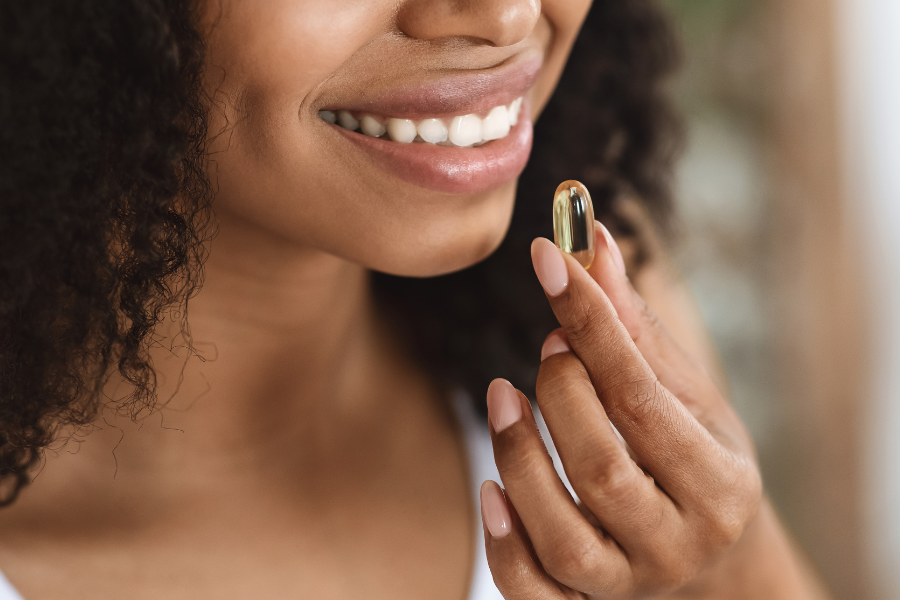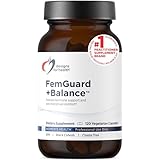Looking for the ultimate guide to nutrition for perimenopause? Check out the top 13 foods to support healthy hormones in perimenopause and beyond!
Nutrition for Perimenopause: What to Eat in Your 40s and Beyond
I’ve said it before and I’ll say it again- perimenopause can feel like you’re suddenly playing by different rules. Those hormonal changes affecting your body—from hot flashes and night sweats to mood swings, weight gain, and irregular periods—aren’t just inconvenient; they’re signals that your nutritional needs are evolving. The good news? What you eat can make a dramatic difference in the classic symptoms of perimenopause and menopause, and make the process easier.
A balanced diet of whole, non-processed foods, healthy fats, lean proteins, and fiber-rich foods can support your hormonal balance, stabilize blood sugar levels, and help you manage weight gain, mood changes, and sleep problems.
Let’s explore how the right foods can help you maintain overall health and energy levels while reducing your risk of chronic diseases like metabolic syndrome, high blood pressure, cardiovascular disease, and breast cancer.
This guide is designed specifically for women in their 40s and beyond. We’ll cover how to support your hormones naturally through diet, how to manage common perimenopausal symptoms, and how to create a sustainable, hormone-supportive lifestyle with the best foods for perimenopause.
Why Nutrition Matters in Perimenopause
Perimenopause is the time leading up to menopause, which is officially diagnosed after you’ve gone 12 consecutive months without a menstrual period. This period of time can last several years, with fluctuating estrogen and progesterone levels impacting everything from your mood to your metabolism. It can start as early as your late 30s but the average age is your mid 40s, with the average age of menopause being mid 50s.
For more info on the stages and phases of perimenopause check out this blog!
Common Perimenopause Symptoms
- Hot flashes and night sweats
- Mood swings and irritability
- Weight gain, particularly around the midsection
- Sleep problems and fatigue
- Vaginal dryness
- Irregular periods
- Brain fog and decreased focus
- Increased cholesterol levels and cardiovascular risk
What Changes During This Time?
As noted above perimenopause has phases and stages.
Here’s what is typically happening during these phases:
- Estrogen levels fluctuate dramatically, impacting temperature regulation, brain function, metabolism, and the balance between insulin and blood sugar levels. Quite often in the first phase, a woman will experience Estrogen Dominance, with estrogen going up (and then sometimes down). Or estrogen dominance can be a state that occurs due to estrogen remaining on high end and progesterone continuing to decline.
- Progesterone often declines first, reducing your body’s natural calming signals and making you more sensitive to stress.
- Cortisol and insulin can rise, promoting fat storage and metabolic changes.
- Testosterone can fall, though this doesn’t happen to every woman
I talk about all kinds of solutions on this blog, and nutrition is a key topic not to be underestimated when it comes to hormone balance.
A perimenopause diet focused on key nutrients can:
- Stabilize hormones- a diet balanced in protein, fat, and whole carbohydrates can help stabilize hormones and regulate the roller coaster of hormones common in perimenopause.
- Support detoxification and gut health- Having good detoxification and elimination via your gut and bowel movements can help rid your body of excess toxic estrogen metabolites and reduce the effects of estrogen dominance.
- Balance blood sugar levels- Keeping blood sugar stable can be very helpful in regulating cortisol, which then helps balance your estrogen and progesterone and helps keep your mood, weight, and energy levels stable.
- Promote bone health: Bone loss is quite common, and eating enough calcium, magnesium, and boron can greatly help maintain bone health (as can exercise).
- Aid in weight management- Weight gain is so common in perimenopause, with the average being 7-10 pounds, so getting ahead of the game and eating well can help limit this average weight gain and potentially avoid it.
- Improve energy levels and sleep- Energy levels can be a big challenge in perimenopause and menopause, and good nutrition via a supportive diet can really help with sleep and energy levels.
Top 13 Best Foods for Perimenopause

1. Leafy Greens (Spinach, Kale, Arugula, Swiss Chard)
Leafy greens are calcium-rich foods that also provide magnesium, potassium, and fiber—key players in blood pressure, bone density, and hormonal balance.
- Estrogen benefit: Support estrogen metabolism through fiber and detox pathways.
- Bone health: High in vitamin K and calcium.
- Energy support: Rich in B vitamins and iron.
Try this: Add spinach to a smoothie or sauté kale in olive oil with garlic. Double up on your regular servings of leafy greens- this will boost your nutrition and fill you up!
2. Fatty Fish (Salmon, Mackerel, Sardines)
Fatty fish are loaded with omega-3 fatty acids, especially EPA and DHA, which help reduce inflammation, lower triglycerides, and support brain function. Walnuts, chia seeds, and flax seeds are a good veggie source of omega 3s (see below for more info)
- Mood swings: Omega-3s support neurotransmitter balance.
- Cardiovascular disease risk: Fatty acids improve cholesterol levels.
- Hot flashes: May reduce frequency and intensity.
Goal: Two servings of fatty fish per week (unfortunately, more can lead to excess mercury levels, see below for info on omega 3 supplementation)
3. Whole Grains (Quinoa, Oats, Brown Rice, Millet)
Whole grains are fiber-rich foods that also supply B vitamins, iron, and complex carbohydrates that keep your blood sugar stable. They are a source of fiber and nutrition that are significantly better for our bodies than the current abundance of processed carbs in our modern-day cultures (think anything from white flour or made with sugar).
- Weight management: High fiber keeps you full.
- Gut microbiome: Prebiotic fiber supports healthy digestion.
- Blood sugar levels: Better than white bread or refined carbs.
Pro Tip: Read labels and look for a ratio of 1 gram of fiber for every 10 grams of carbs (and the more fiber the better).
4. Legumes (Lentils, Chickpeas, Black Beans)
Plant-based diets that include legumes have been shown to support hormonal balance and cardiovascular health.
- Phytoestrogens: Can support estrogen levels gently. There is no need to fear phytoestrogens; they don’t actually act as estrogen, and they help support healthy levels.
- Daily protein intake: Excellent source of lean proteins.
- Bone support: Rich in magnesium and folate.
- Fiber rich: Legumes are full of fiber, which helps us detox unhealthy estrogen metabolites and process other toxins that we encounter on a daily basis.
Pro tip: Try lentil soup with turmeric and lemon for a hormone-friendly lunch. Or substitute chickpea pasta for regular pasta.
5. Nuts and Seeds (Chia Seeds, Flax, Walnuts, Pumpkin Seeds)
These are powerhouse snacks loaded with healthy fats, fiber, and minerals. Walnuts, chia seeds and flax in particular provide plant-based omega-3s and lignans. Pumpkin seeds are also a powerhouse of protein, fiber, and minerals to support your hormones.
- Cholesterol levels: Soluble fiber and healthy fats improve lipid profile (i/e can help improve your bad cholesterol and reduce the risk for heart disease)
- Estrogen detox: Lignans support liver metabolism.
- Hormonal balance: Help reduce hot flashes and vaginal dryness.
Serving Suggestion: 1–2 tablespoons daily in smoothies, salads, or yogurt- or as a snack with some fruit.
6. Cruciferous Vegetables (Broccoli, Cauliflower, Brussels Sprouts)
Rich in sulforaphane and indole-3-carbinol, these vegetables support estrogen detox through the liver. They also contain the elements for your body to make DIM- super helpful in reducing estrogen dominance.
- Breast cancer protection: Help reduce excess estrogen.
- Gut health: Contain fiber and antioxidants.
- Bone support: Provide calcium and vitamin K.
Try this: Roasted broccoli with garlic and a splash of lemon juice.
7. Berries (Blueberries, Strawberries, Blackberries, Raspberries)
Packed with antioxidants and polyphenols, berries reduce oxidative stress and inflammation—two contributors to perimenopausal symptoms.
- Brain function: Antioxidants support memory and mood.
- Low sugar: A fresh fruit that won’t spike blood sugar, this is because fruits are fiber rich, in most cases. But it’s always best to eat your fruit with a little bit of protein and fat (see meal plan ideas at the end of the post)
- Skin & aging: Improve collagen and cell repair.
Bonus: 1 cup of berries = ~8 grams of fiber.
8. Avocados
Avocados are one of the best sources of healthy fats, potassium, and fiber. They help stabilize blood sugar and support hormone production.
- Weight loss aid: Fats + fiber keep you full.
- Vitamin B6 & folate: Improve mood regulation.
- Good sources: Healthy fats without raising cholesterol.
Bonus: Avocados are also a decent protein source!
9. Greek Yogurt
Rich in protein and calcium, dairy products like Greek yogurt also offer probiotics to support gut and immune system health. If you can’t tolerate yogurt that’s ok, try adding a healthy protein powder to coconut yogurt to get the benefits of healthy probiotics and protein.
- Bone health: Calcium and vitamin D (if fortified).
- Lean proteins: 15–20 grams per serving.
- Digestive health: Choose those with live active cultures.
Avoid: Flavored yogurts with more than 8g added sugar. It’s best to stick with plain yogurt and add in real berries and nuts to make a yogurt bowl. You can even add a touch of vanilla extract and cinnamon to give it a bit more flavor without adding more sugar.
10. Dark Chocolate (80%+ Cacao)
A surprising ally in hormone support, dark chocolate is high in magnesium and flavonoids.
- Mood support: Encourages serotonin production.
- Heart health: Improves blood vessel function.
- Craving control: A small square satisfies without derailing your diet.
Pro Tip: Definitely check the percentage of chocolate- a company can call their chocolate dark if it contains more than 50% chocolate. Chocolates that are lower than 80% dark chocolate often contain too much sugar and not enough flavonoids and fiber than darker chocolates do.
11. Olive Oil (Extra Virgin)
A cornerstone of the Mediterranean diet, olive oil is rich in anti-inflammatory polyphenols and healthy monounsaturated fats.
- Cholesterol levels: Supports heart and brain health.
- Hormonal changes: Helps absorb fat-soluble vitamins.
- Versatile: Use for dressings, low-heat cooking, or drizzling over veggies.
Tip: Other healhy oils that, unlike Olive Oil, are safe to cook at high temperatures are avocado oil, coconut oil, or walnut oil.
12. Eggs
One of the most nutrient-dense foods available, eggs offer high-quality protein, B12, and choline. Gone are the days of the fear of eating eggs due to cholesterol- that connection has been debunked!
- Lean proteins: Ideal for breakfast or lunch.
- Brain support: Choline is essential for cognition (think healthy brain function)
- Weight management: Satiating and blood sugar-friendly.
13. Fermented Foods (Kimchi, Sauerkraut, Kefir, Tempeh)
Support a diverse gut microbiome and promote digestion and immunity.
- Immune system: Linked to gut health.
- Estrogen metabolism: Healthy microbes assist hormone clearance.
- Probiotic-rich: Choose refrigerated, unpasteurized versions.
Tip: Also of note it’s always good to read the label and make sure any fermented food item (particularly kombucha) doesn’t contain added sugar.
Daily Nutrition Goals for the Perimenopause Diet
No diet is perfect for everyone person, we all have unique nutrition needs. But here are some general guidelines to keep in mind when planning a perimenopause supportive diet.
- Daily protein intake: 90–120g/day or ~30–40g per meal (adjust for physical activity). If you are very active and working to build muscle via strength training then shoot for 120. Less active? Choose the lower end like 90 grams, or even 80 may suffice. Protein needs depend on your size so this is a rough estimate and if you are small framed you may need less.
- Fiber: 35g/day from fruits, vegetables, legumes, and whole grains. If you striggle with getting this try adding a supportive fiber powder like SunFiber or organic Psyllium husk powder.
- Added sugar: <20g per day. Read your labels and keep your added sugar to less than 20 grams per day, not counting natural sugar that is in whole fruits.
- Water: Half your body weight in ounces (e.g., 150 lbs = 75 oz), up to 100 ounces. You can meet this goal with plain filtered water (filtering is best for your hormones), sparking water, herbal teas, or low caffeine teas. Alcohol and coffee don’t count toward your fluid goals.
Sample 3-Day Perimenopause Meal Plan
Need help putting these recommendations into reality? Well, here you go! Of course this is just a sample 3 day plan to give you an idea how to get in all of your goals and keep out the stuff you want to avoid.
Day 1
Breakfast: Scrambled eggs, sautéed kale, ½ avocado, slice of sprouted toast
Lunch: Lentil quinoa bowl with roasted veggies and olive oil vinaigrette
Snack: Greek yogurt with chia seeds and raspberries
Dinner: Baked salmon, steamed broccoli, sweet potato, and lemon tahini sauce
Day 2
Breakfast: Oatmeal (even better if it’s high protein oatmeal) with flax, walnuts, cinnamon, and blueberries
Lunch: Chickpea salad with cucumbers, cherry tomatoes, arugula, and feta
Snack: Cottage cheese and fresh pineapple slices
Dinner: Grilled mackerel or chicken, roasted Brussels sprouts, wild rice pilaf. If you are a vegetarian you could instead eat a legume or tofu based meal.
Day 3
Breakfast: Chia pudding made with almond milk and topped with sliced strawberries
Lunch: Turkey lettuce wraps with avocado and hummus, carrot sticks
Snack: Boiled egg, apple slices, almond butter
Dinner: Stir-fried tofu with bok choy, edamame, and brown rice
Gut Health, Estrogen Detox & Hormonal Balance

Your gut microbiome plays a major role in estrogen metabolism. The estrobolome is the collection of gut bacteria that influences how estrogen is broken down and recirculated. If your gut is imbalanced (dysbiosis), you may reabsorb estrogen improperly, leading to estrogen dominance. This could mean more mood swings, weight gain, and sleep problems (think 3-4 a.m. wake up calls).
Best Foods for Gut & Hormone Health:
- Fermented foods: kefir, kimchi, sauerkraut
- Prebiotics: garlic, onions, leeks, asparagus
- Resistant starch: cooled oats, potatoes, rice
- Fiber: flaxseeds, berries, cruciferous vegetables
As noted above prebioitc and probioitic rich foods support liver detox alongside cruciferous veggies, water, and adequate protein intake. Avoid alcohol, excess sugar, and heavily processed foods that burden detox pathways.
Smart Supplement Strategies

While food is the foundation of hormone balance, supplements can help support your hormone balance goals. Here are some of the key supplements that can help balance your hormones, followed by some of the blends I find to be very helpful myself and with my patients. You can also read this blog on the most helpful supplements in perimenopause.
- Vitamin D3 + K2: for bone health and immune support. It’s always best to have your levels checked and make sure you are taking what you need- not too much and not too little- as these are fat soluble vitamins that can be toxic if overdone.
- Magnesium glycinate: supports sleep, mood, and muscle relaxation. Magnesium glycinate has less of an effect on your bowels. Magnesium citrate is the best option if you have constipation and are looking for support.
- Fish oil or algae-based omega-3s: supports cholesterol and cardiovascular health, and are anti-inflammatory and hormone balancing naturally.
- Probiotic with lactobacillus and bifidobacteria: supports gut and hormone health. I love Venus Vital by Happy Mammoth and you can save 15% with this link!
- Calcium (from food preferred): Goals for calcium are usually 1000-1500 mg per day, which can be trick to get from diet. If you supplement calcium don’t take more than 500mg at one time, your body can’t absorb that much and it can adveresely affect your heart.
Always consult a healthcare provider before starting a new supplement routine.
Blends that can be super helpful in hormone balance in perimenopause:
- Hormone Harmony by Happy Mammoth: This blend contains maca, berberine, vitex, and many more herbs to help balance hormones and support a healthy weight and blood sugar. It is very potent so start small and stop wherever you feel best, and be sure to talk to your provider about this before adding it.

- FemGuard Balance by Designs for Health: An adaptogenic blend that has both DIM and Black Cohosh to help balance estrogen throughout perimenopause stages, as well as vitex for progesterone support.
Designs for Health FemGuard + Hormone Balance for Women - DIM, Black Cohosh, Calcium D-Glucarate, EGCg Green Tea Extract & Chaste Tree Supplement for Mood Support & Estrogen Metabolism (120 Capsules)
- FemGuard Balance Complex for Women - FemGuard + Balance contains classic women's health-supportive herbs in the form of vitex, polygonum and black cohosh root, along with DIM and chrysin.*
- Promotes Healthy Estrogen Metabolism - Includes 100 mg of DIM (diindolylmethane) to promote the production of the more beneficial estrogen metabolites over the potentially toxic estrogen byproducts to support estrogen balance for women and optimal health. Calcium-D-glucarate promotes the proper elimination of excess estrogens.*
- Mood Support & More - Black Cohosh supports hormone balance, especially during menopause, and the normal production of neurotransmitters that also offer mood support. Chaste tree extract (vitex supplement for women) supports estrogen and progesterone levels.*
- Premium Nutrients & Botanicals - Features nutrients and phytochemicals to further support overall health and estrogen metabolism, including bioactive B12 folate, P5P vitamin B6, magnesium, resveratrol, green tea extract (EGCg), and broccoli seed extract.*
- Clinically-Trusted Care - DFH is the #1 practitioner supplement brand recommended by functional medicine professionals and the #1 practitioner supplement brand personally trusted by functional medicine professionals.**
Lifestyle Tips & Mindset Shifts
Perimenopause often brings uncertainty mixed with feeling back to normal. You might experience symptoms for consecutive months and then feel fine for a while—this is normal. Instead of focusing on restriction, reframe nutrition as nourishment.
Simple Changes That Make a Big Impact:
- Eat balanced meals every 4–6 hours with protein, fiber, and fat
- Limit refined sugar, red meat, and processed snacks
- Emphasize lean proteins, fresh fruit, and leafy greens
- Stay active: walking, strength training, pilates, cycling, swimming, or yoga can all be hormone supportive
- Prioritize sleep and stress reduction techniques. Try to go to sleep and wake up around the same time every day. Try doing a quick meditation before bed, and/or deep breathing sessions throughout the day. Check out this blog for more ideas!
FAQs
Q: Can I still enjoy wine or coffee?
Yes—in moderation. Limit caffeine to morning hours if sleep is disrupted (less than 200 mg of caffeine per day is best), and limit alcohol to 2–3 drinks per week. But the less the better on both coffee and alcohol.
Q: Should I try intermittent fasting?
A 12–14 hour overnight fast may support insulin sensitivity, but extreme fasting can worsen hormonal imbalances.
Q: How do I get enough protein if I don’t eat meat?
Focus on legumes, tofu, tempeh, Greek yogurt, healthy protein powders, lean meats, and fish.
Q: What if I’m gaining weight despite eating well?
Evaluate sleep, stress, hydration, and protein/fiber intake. Hormone testing may reveal thyroid, estrogen, or cortisol imbalances.
Q: Are soy products safe during perimenopause?
Yes! Whole, non-GMO, organic soy (edamame, tofu, tempeh) can support hormonal balance and reduce hot flashes.
Q: What’s the best way to build a hormone-supportive plate?
Fill half your plate with vegetables (especially cruciferous), one quarter with lean protein, and one quarter with complex carbs.
Final Thoughts
Nutrition for perimenopause and menopause can be a game-changer. Avoiding processed carbs and aim for real food high in fiber, protein, and healthy fats. These top 13 foods can make a big difference in helping you feel your best, and keep your hormones healthy and balanced.
Stick to these nutrition pillars:
- 30–40g protein per meal
- 35g fiber daily
- <20g added sugar per day
- Half your weight in ounces of water daily
These simple changes can improve perimenopausal symptoms like hot flashes, night sweats, mood changes, as well as reduce the risk of osteoporosis, protect your heart, and support long-term weight management. Work with a registered dietitian, integrative/functional medicine trained or other healthcare provider well trained in nutrition to personalize your plan.
With the right foods, you can support hormonal balance, feel more like yourself again, and thrive through your 40s, 50s, and beyond.
Your power plate is waiting! Want more info on perimenopause support? Check out these blogs and check out my YouTube channel.
10 Natural Solutions for Irregular Periods in Perimenopause
A Complete Guide: How Does Perimenopause Affect You?
Ultimate Guide: Stages of Perimenopause and What to Expect

Dr. Shelley Meyer is a board-certified family physician and Institute of Functional Medicine-certified functional medicine physician, as well as a Registered Dietitian. She is passionate about helping women navigate the roller coaster of perimenopause and postmenopause. She has her own Functional Medicine Practice in Denver, Colorado.







Leave a Reply
You must be logged in to post a comment.